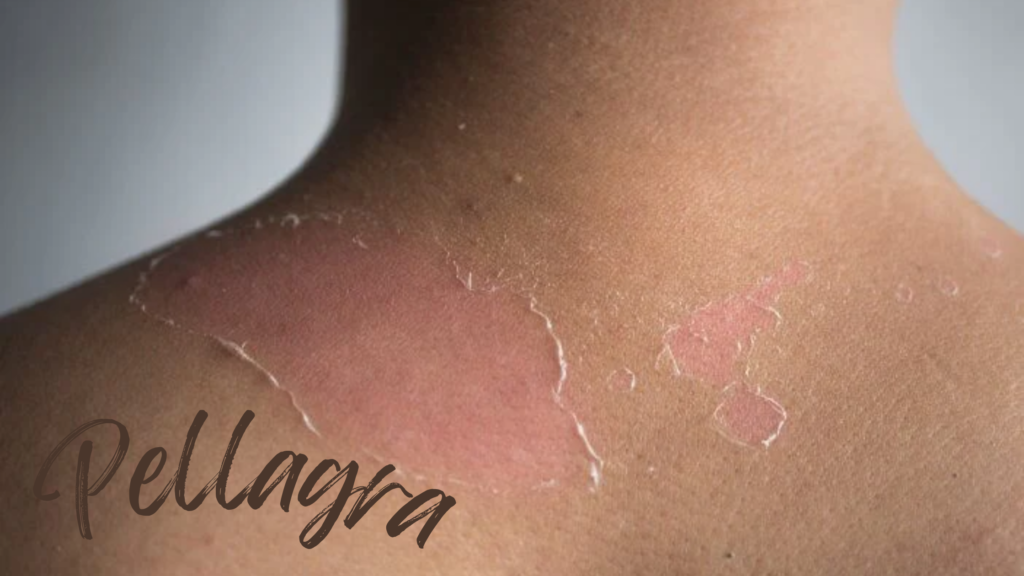🌾 Pellagra
Pellagra is a nutritional deficiency disease caused by a lack of niacin (vitamin B3) or its precursor tryptophan in the diet. It primarily affects the skin, digestive system, and nervous system and can be fatal if left untreated.
🧬 Cause
- Primary cause: Inadequate intake of niacin (vitamin B3) or tryptophan
- Secondary causes: Conditions that interfere with niacin absorption or metabolism, such as:
- Chronic alcoholism
- Malabsorption disorders (e.g. Crohn’s disease)
- Carcinoid syndrome
- Hartnup disease (a rare genetic disorder)
- Isoniazid or 5-fluorouracil (certain drugs can cause pellagra)
🔄 Niacin Functions
- Essential for cellular metabolism
- Helps form NAD and NADP, coenzymes involved in energy production
- Supports DNA repair, brain function, and healthy skin
⚠️ Classic Symptoms – “3 Ds” (and a 4th if untreated)
| Symptom | Description |
|---|---|
| 🟤 Dermatitis | Symmetrical, scaly, red rash in sun-exposed areas (often on neck, hands – called “Casal’s necklace”) |
| 💩 Diarrhea | Digestive issues: nausea, vomiting, abdominal pain |
| 🧠 Dementia | Irritability, depression, confusion, hallucinations |
| ☠️ Death | If untreated, pellagra can lead to death |
🧪 Diagnosis
- Based on clinical symptoms, diet history, and response to niacin therapy
- Lab tests may show low levels of niacin or NAD/NADP, but not routinely available
- Rule out other causes of similar symptoms (e.g. other B-vitamin deficiencies)
💊 Treatment
- Niacin or nicotinamide supplements:
- Mild cases: Oral niacin (100–300 mg/day in divided doses)
- Severe cases: Injectable nicotinamide
- Treat underlying causes (e.g. alcoholism, malabsorption)
- Ensure adequate protein intake (for tryptophan)
- Symptom improvement usually starts within a few days
🛡️ Prevention
- Balanced diet with:
- Whole grains
- Legumes
- Meat, fish, poultry, eggs
- Fortified cereals or bread
- Niacin supplementation in at-risk populations (e.g. alcoholics, refugees)
📍 At-Risk Populations
- People with poverty-related malnutrition
- Diets heavily based on untreated maize (corn) (niacin is bound and unavailable unless treated with alkali)
- Chronic alcohol users
- Individuals with malabsorptive disorders
✅ Key Facts
- Pellagra is a completely preventable and treatable disease
- The “3 Ds” – dermatitis, diarrhea, dementia – are classic signs
- A niacin-rich diet or supplement can rapidly reverse symptoms
- Still seen in developing countries or among malnourished individuals
